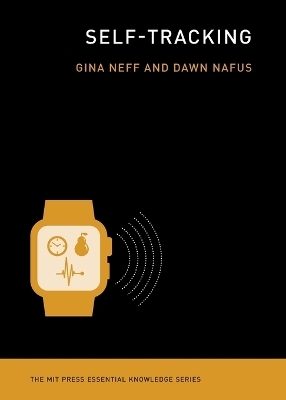
Self-Tracking
Seiten
2016
MIT Press (Verlag)
978-0-262-52912-9 (ISBN)
MIT Press (Verlag)
978-0-262-52912-9 (ISBN)
What happens when people turn their everyday experience into data: an introduction to the essential ideas and key challenges of self-tracking.
People keep track. In the eighteenth century, Benjamin Franklin kept charts of time spent and virtues lived up to. Today, people use technology to self-track: hours slept, steps taken, calories consumed, medications administered. Ninety million wearable sensors were shipped in 2014 to help us gather data about our lives. This book examines how people record, analyze, and reflect on this data, looking at the tools they use and the communities they become part of. Gina Neff and Dawn Nafus describe what happens when people turn their everyday experience-in particular, health and wellness-related experience-into data, and offer an introduction to the essential ideas and key challenges of using these technologies. They consider self-tracking as a social and cultural phenomenon, describing not only the use of data as a kind of mirror of the self but also how this enables people to connect to, and learn from, others.
Neff and Nafus consider what's at stake: who wants our data and why; the practices of serious self-tracking enthusiasts; the design of commercial self-tracking technology; and how self-tracking can fill gaps in the healthcare system. Today, no one can lead an entirely untracked life. Neff and Nafus show us how to use data in a way that empowers and educates.
People keep track. In the eighteenth century, Benjamin Franklin kept charts of time spent and virtues lived up to. Today, people use technology to self-track: hours slept, steps taken, calories consumed, medications administered. Ninety million wearable sensors were shipped in 2014 to help us gather data about our lives. This book examines how people record, analyze, and reflect on this data, looking at the tools they use and the communities they become part of. Gina Neff and Dawn Nafus describe what happens when people turn their everyday experience-in particular, health and wellness-related experience-into data, and offer an introduction to the essential ideas and key challenges of using these technologies. They consider self-tracking as a social and cultural phenomenon, describing not only the use of data as a kind of mirror of the self but also how this enables people to connect to, and learn from, others.
Neff and Nafus consider what's at stake: who wants our data and why; the practices of serious self-tracking enthusiasts; the design of commercial self-tracking technology; and how self-tracking can fill gaps in the healthcare system. Today, no one can lead an entirely untracked life. Neff and Nafus show us how to use data in a way that empowers and educates.
Gina Neff is Associate Professor of Communication and Sociology and a senior data scientist at the University of Washington. She is the author of Venture Labor: Work and the Burden of Risk in Innovative Industries (MIT Press). Dawn Nafus is Senior Research Scientist at Intel Labs and the editor of Quantified: Biosensing Technologies in Everyday Life (MIT Press).
| Erscheinungsdatum | 04.08.2016 |
|---|---|
| Reihe/Serie | MIT Press Essential Knowledge series |
| Zusatzinfo | 4 b&w illus., 1 table; 5 Illustrations |
| Sprache | englisch |
| Maße | 127 x 178 mm |
| Themenwelt | Sachbuch/Ratgeber ► Gesundheit / Leben / Psychologie |
| Informatik ► Software Entwicklung ► User Interfaces (HCI) | |
| Naturwissenschaften | |
| ISBN-10 | 0-262-52912-2 / 0262529122 |
| ISBN-13 | 978-0-262-52912-9 / 9780262529129 |
| Zustand | Neuware |
| Haben Sie eine Frage zum Produkt? |
Mehr entdecken
aus dem Bereich
aus dem Bereich
Aus- und Weiterbildung nach iSAQB-Standard zum Certified Professional …
Buch | Hardcover (2023)
dpunkt Verlag
34,90 €
Lean UX und Design Thinking: Teambasierte Entwicklung …
Buch | Hardcover (2022)
dpunkt (Verlag)
34,90 €
Wissensverarbeitung - Neuronale Netze
Buch | Hardcover (2023)
Carl Hanser (Verlag)
34,99 €


